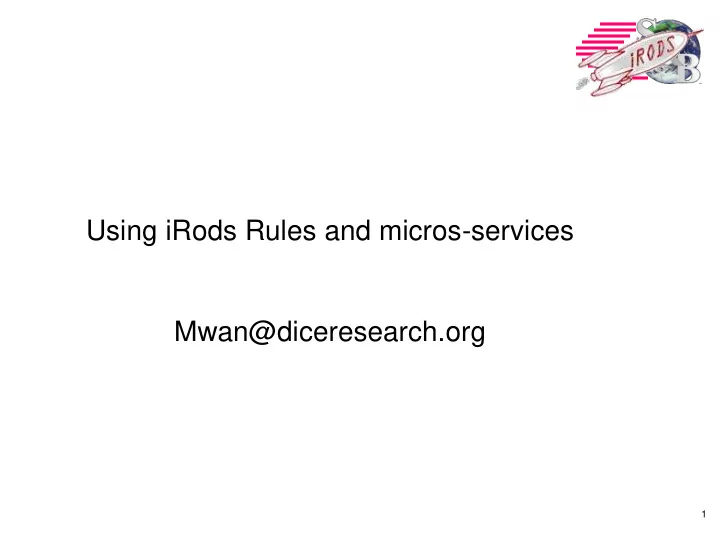

Using iRods Rules and micros-services Mwan@diceresearch.org 1
Overview • Structure of the rule language • Components of the rules language and how they fit together • Use of rule language for rule and workflow designs. 2
iRods Rules • Each rule defines • An action for an event • Condition • Action chains (micro-services and rules) • Recovery chains • Invoked by servers to enforce policies • Invoked by clients to run workflows on servers • Rule types • Atomic -- applied immediately • Deferred -- run at a later time in the background • Periodic – run at a fix time interval 3
Format of a Rule • Action | Condition | MS 1 , …, MS n | RMS 1 , …, RMS n • Action • Name of action to be performed • Name known to the server and invoked by server • Condition – condition under which the rule apply • Micro-services - If applicable micro services will be executed • Recovery micro-service - If any micro service fails, recovery micro service(s) executed to maintain transactional consistency • Example of MS/RMS • createFile(*F) removeFile(*F) • ingestMetadata(*F,*M) rollback 4
Condition • Condition under which this Rule applies • Examples • $rescName == demoResc8 • $objPath like /x/y/z/* • Many operators • ==, !=, >, <, >=, <= • %%, !! (and, or) • expr like reg-expr , expr not like reg-expr , expr ::= string 5
Rule parameters • A long list of session system parameters – • Start with ‘$’ • Similar to global parameters • $rescName , $objPath, $rescGroupName, $dataType, $dataSize, $chksum, $dataOwnerName, $dataId, $collId, $dataExpiry, $dataCreate • Parameters that are passed between micro-services • Start with * - variable • Literal string 6
Micro-services (MSs) • Well-defined Server-side Procedures and Functions • C functions on servers • MSs can be chained to form workflow using ‘##’ • msiDataObjOpen(*A,*S_FD)##msiDataObjRead(*S_FD,10000,*R_BUF)##msiDataObjClose(*D_FD,*stat) • Flow control • whileExec - while loop • forExec – for loop • forEachExec – for each in the table or list • break • ifExec – if-else 7
Micro-services – flow control examples • whileExec • assign(*A,0)##whileExec( *A < 20 ,writeLine(stdout,*A)##assign(*A, *A + 4), nop##nop) • forExec • forExec(assign(*A,0), *A < 20 , assign(*A,*A + 4), writeLine(stdout,*A),nop) • ifExec • ifExec(*A > *D,assign(*A,*D),nop,assign(*D,*A),nop) 8
Other Micro-services • delayExec - execute MSs at a later time • Exec by the iRods batch server (irodsReServer) in the background • Example • delayExec(<PLUSET>1m</PLUSET>,msiReplColl(*desc_coll,*des c_resc,backupMode,*outbuf),nop) • Time keywords • PLUSET – exec after the specified time has passed • ET – exec at the specified time (<ET>23:00</ET>) • FT – repeat exec at the specified frequency • Can be combined • <PLUSET>1m</PLUSET><EF>5m</EF> • remoteExec – execute MSs on remote servers • remoteExec(andal.sdsc.edu,null,msiSleep(10,0)##writeLine(std out,open remote write in andal), nop) • assign - assign a value to a parameter • writeString - write a string to stdout buffer • writeLine - write a line (with end of line) to stdout buffer 9
Micro-Services parameters • Micro-services communicate through: • Arguments/Parameters • Input from the initiator (client/server) • Lieterals • Variables • start with * • Output of a MS can be used as input of another MS in a MS chain • System Session Parameters • Satart with “$” • Valid across rule invocations • Persistent data – iCat • Query the iCat • Valid across sessions • XMessages – out-of-band communications • Sender obtains send/receive tickets • Pass receive ticket to receivers • Receiver use ticket to read msg • Msg exchange • Between Parallel Session • Between the batch manager and the task manager on the task status 10
Example of passing parameters between Micro-services • trimColl.ir file: • myTestRule||acGetIcatResults(*Action,*Condition,*B)##forE achExec(*B,msiDataObjTrim(*B,tgReplResc,null,1,null,*C),n op)|nop##nop • *Action=trim%*Condition= COLL_NAME = '/tempZone/home/rods/loopTest' • *Action%*Condition • irule – F trimColl.ir 11
Micro-services for managing the core.irb file • showCore.ir – list the rules in core.irb myTest||msiAdmShowIRB(*A)|nop • chgCoreToOrig.ir - replace core.irb with core.irb.orig myTest||msiAdmChangeCoreIRB(*A)|nop *A=core.irb.orig • chgCoreToCore1.ir – append the rules in core.irb1 on top of core.irb myTest||msiAdmAppendToTopOfCoreIRB(*A)|nop *A=core.irb.1 • whatever rules on top are executed first • Rules in core.irb.1 overides core.irb 12
Recommend
More recommend